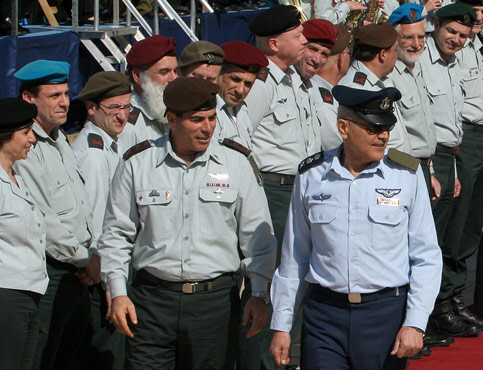The Harvard Crimson 18 February 2007

Israel’s new Chief of Staff Lieutenant-General Gabi Ashkenazi (2nd L) and outgoing army Chief of Staff Lieutenant-General Dan Halutz attend a handover ceremony at the Israeli Ministry of Defense in Tel Aviv, 14 February 2007. (MaanImages/Moti Milrod)
Gabriel Ashkenazi, a 2004 graduate of Harvard Business School who was appointed chief of staff of the Israeli Defense Forces this weekend, has come under fire from activists at Harvard who say Ashkenazi was responsible for human rights abuses before his arrival in Cambridge. [*]
In e-mails to The Crimson, the activists alleged that Ashkenazi was responsible for abuses during Israel’s 22-year occupation of southern Lebanon and for his role in overseeing the construction of the barrier separating Israel and several of its settlements from the rest of the West Bank. They also questioned the Business School’s decision to admit Ashkenazi, noting that the alleged abuses had occurred and been documented before he arrived at Harvard.
“Harvard should be extremely wary of admitting or hiring anyone who has a credible, public record of … serious violations of human rights or humanitarian law,” said Darryl C. Y. Li ‘01, a PhD student in anthropology and human rights and a member of Harvard’s Alliance for Justice in the Middle East. “We are concerned because [Ashkenazi] was the commander of specific units that committed specific abuses against specific victims.”
The Business School declined to comment, citing its policy of not discussing admissions decisions.
According to some Israeli news accounts — including one in Haaretz, often regarded as one of Israel’s newspapers of record — Ashkenazi was “often seen as the most moderate member of the General Staff” when he served as its second-in-command.
He “objected to aggressive acts against the Palestinians” and tried to have the separation barrier “built as close as possible to the Green Line [to] not infringe” on Palestinian life, according to the paper.
In a statement released last night through a spokesman, Harvard Students for Israel President Dana Stern ‘09 supported Ashkenazi’s appointment, saying that he had served “respectfully and humanely in Sinai and Lebanon.”
“Politically motivated organizations often attempt to unjustly criticize Israeli officials under the guise of human rights,” Stern said, “but the fact remains that the IDF is one of the most morally conscious armies in the world and only promotes the most highly respected soldiers to its top ranks.”
Though the activists criticized Ashkenazi’s role in building the separation barrier — saying it has been “universally condemned as illegal by the international community” — they emphasized that his actions in southern Lebanon were more problematic. As the “effective supervisor” of the South Lebanon Army (SLA), and later as head of the Israeli Northern Command, they charged, Ashkenazi was responsible for many of the abuses that occurred in the occupied Lebanese territories.
In particular, the activists added, Ashkenazi bore responsibility for the torture of thousands of Lebanese civilians at the Khiam prison, the coercion of Lebanese civilians to collaborate with the occupation, and the expulsion of Lebanese civilians from the occupied territory.
Though Ashkenazi has never been charged with wrongdoing in an Israeli or international court, a report by B’Tselem said that Israeli military units — units Ashkenazi held high-level positions in and eventually commanded — were responsible for financing, arming, and controlling the SLA.
Amnesty International called the SLA “Israel’s proxy militia” in a 2000 report, and said that the “Khiam Detention Centre is [its] main detention and interrogation centre in Israeli-occupied Lebanon.”
“About 150 people are believed to be held at Khiam, where prisoners have been held without charge or trial for up to 14 years,” Amnesty said in the report, which did not single out any Israeli commanders for wrongdoing. “Former detainees have described systematic torture and ill-treatment, including beating, whipping, torture with electric shocks and dousing with hot and cold water.”
[*] This article was originally published under the title of “Criticism Flies Over HBS Alum” on 6 February 2007. 2007 The Harvard Crimson, Inc. All rights reserved. Reprinted with permission.
